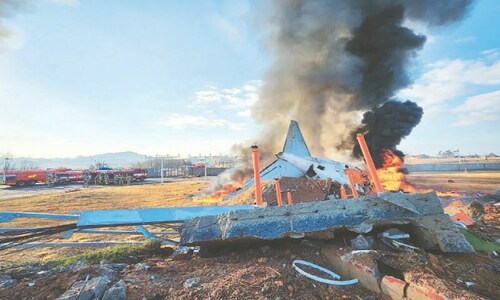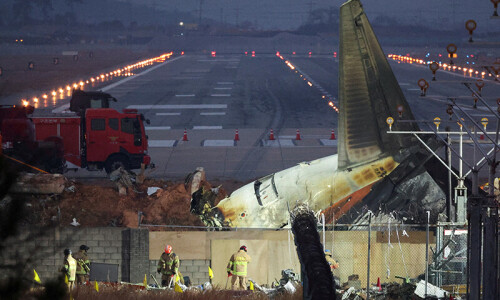ISLAMABAD: The Supreme Court has asked Mumtaz Qadri’s counsel to assist the court by focusing their arguments on the question whether individuals — in contemporary society — can be permitted to unilaterally deal with someone accused of committing blasphemy on the basis of hearsay.
“Will it not instil fear in the society if everybody starts taking the law in their own hands and dealing with sensitive matters such as blasphemy on their own rather than going to the courts,” Justice Asif Saeed Khosa — who is heading a three-member bench — asked on Tuesday.
The bench had taken up two identical appeals against the March 9 judgment of the Islamabad High Court, which accepted Mumtaz Qadri’s plea to annul provisions of the Anti Terrorism Act (ATA) 1997 that he was charged under for the assassination of the Punjab Governor Salmaan Taseer. Advocate Mian Nazir Akhtar had moved one appeal on behalf of Qadri, while the other was moved by the federal government.
Quoting instances such as the lynching of a Christian couple in Kot Radha Kishan, Justice Khosa asked whether an individual has the right to act on his own in such matters without even first ascertaining the facts.
Justice Dost Mohammad Khan, a member of the bench, also stressed the need of exercising restraint because blasphemy accusations were serious and prone to misuse. Allowing individuals to deal with such matters on their own is fraught with danger, especially in divided societies like ours, where even ulema are reluctant to offer prayers with members of other schools of thought, he observed.
On Tuesday, Mian Nazir Akhtar cited the interpretation of different verses of the Holy Quran to establish that whosoever defiles the name of the Holy Prophet (peace be upon him) does not remain a Muslim and should be put to death, since those indulged in sacrilege and defilement were mischief mongers who had fought with Allah and the Holy Prophet (PBUH).
It is the religious duty of a believer to kill an apostate or a blasphemer — a duty that has to be performed by someone even if the state is reluctant to — and permission to deal with such individuals had been granted in Islam 14 centuries ago, the counsel argued.
However, Justice Khosa reminded the counsel that whatever interpretation the counsel was citing, while explaining the exalted position of the Holy Prophet (PBUH), did not deal directly with the act of blasphemy.
Besides, the explanation being advanced were not the words of the Holy Quran, but human interpretations of those words, the judge observed. He said that the authority to award death sentences was vested solely with the courts and not in the hands of individuals.
Justice Khan recalled that the verses the counsel had quoted before the court were all from the Madni period of the Holy Prophet’s (PBUH) life, when he and his companions went to war with non-believers.
After the wars, a peace treaty — the charter of Medina — was signed among the various sides, ending the bitter fighting between Muslims and non-believers, the judge said.
The judge also asked whether Qadri acted under the influence of this knowledge (interpretation of the verses) or if he had been told these things at the end of his trial.
The counsel replied that Qadri had a basic knowledge of religion as he used to attend Islamic lectures at the Daawat-i-Islami, though the head of the organisation disowned Qadri soon after he murdered the former Punjab governor.
Something must have transpired between Qadri and the governor, because other members of the Elite Force detail who were on duty alongside him remained silent spectators while he was pumping bullets into Mr Taseer, the counsel — who is likely to conclude his arguments on Wednesday — said.
Published in Dawn, October 7th, 2015
On a mobile phone? Get the Dawn Mobile App: Apple Store | Google Play















































Dear visitor, the comments section is undergoing an overhaul and will return soon.